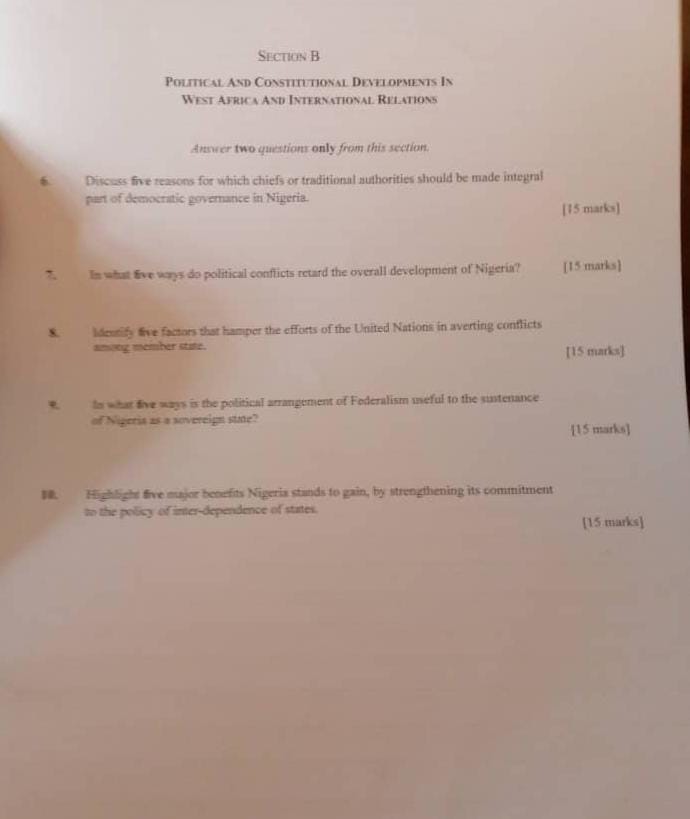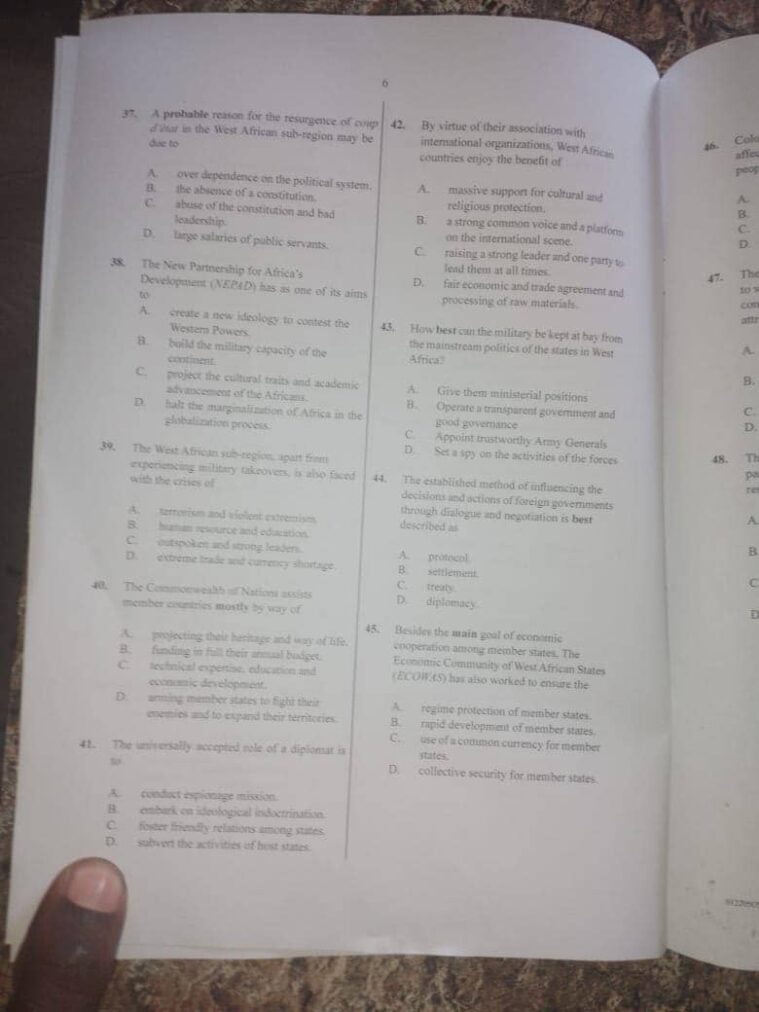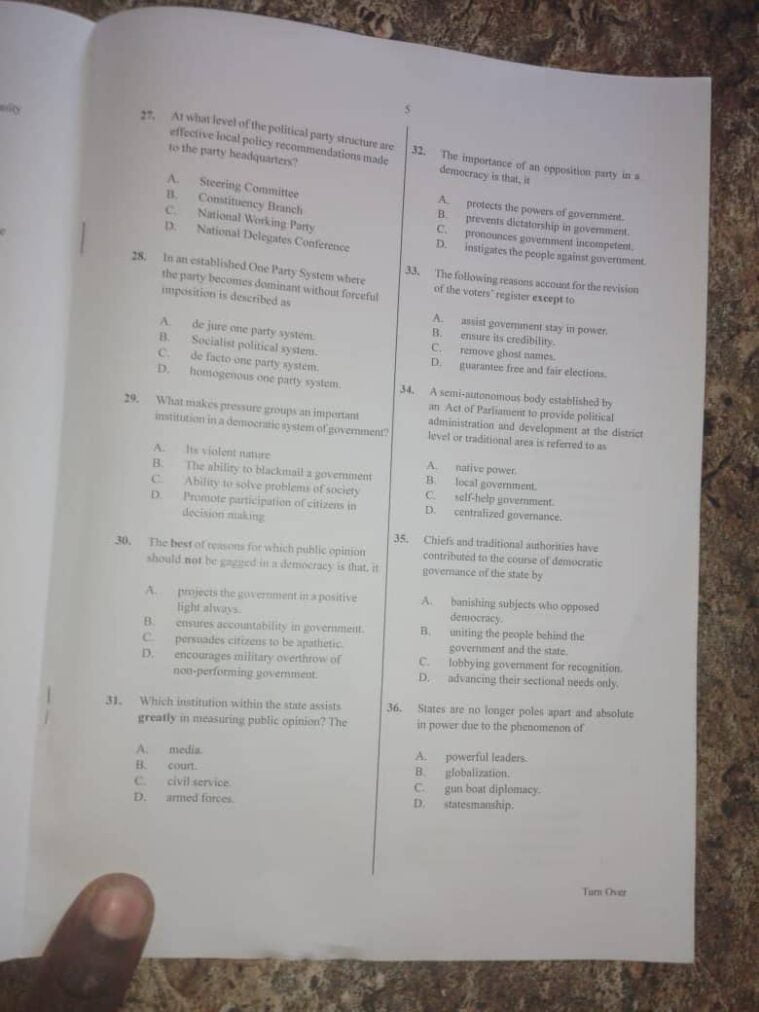TODAY ANSWERS ON 2023 WAEC GCE ENGLISH LANGUAGE OBJ AND THEORY ANSWERS WE BE UPLOADED HERE….
The Time Of 2023 WAEC GCE ENGLISH LANGUAGE PAPERS
Saturday, 9th December, 2023
English Language 2 (Essay) – 9:30am – 11:30am
English Language 1 (Objective) – 11:30am – 12:30pm
English Language 3 (Test of Orals) – 2:00pm – 2:45pm
A. 2023 WAEC GCE ENGLISH LANGUAGE (ESSAY) ANSWERS
Kindly bookmark the website for the answers that will be released here, or better still reload the site to check if the answers for the 2023 Waec GCE English Language Questions and Answers have dropped.
2023 2023 WAEC GCE English Language Essay Answers
Loading……………………………………………
B. 2023 WAEC GCE ENGLISH LANGUAGE OBJECTIVES (OBJ) ANSWERS
Kindly bookmark the website for the answers that will be released here, or better still reload the site to check if the answers for the 2023 Waec GCE English Questions and Answers have dropped.
WAEC GCE English Language Answers
Loading……………………………………………
C. 2023 WAEC GCE English Language (TEST OF ORALS) ANSWERS
Kindly bookmark the website for the answers that will be released here, or better still reload the site to check if the answers for the 2023 Waec GCE English Questions and Answers have dropped.
WAEC GCE English Language Questions and Answers
Loading……………………………………………
Take a look at some of the 2023 WAEC GCE questions and answers we’ve already provided for Government below. Many students/candidates who regularly visit our site find helpful answers for the Government subjects. You too can get yours for free on English Language.
2023 WAEC GCE GOVERNMENT OBJECTIVE ANSWERS – 15th November 2023
======================
OBJ
1-10 BDABAADAC
11-20 DCDADBCCBB
21-30 AADABAAADB
31-40 ABBBBBCDAC
41-50 CDBDDACCBD



GOVERNMENT*
(7)
(PICK ANY FIVE)
(i) Economic Instability: Political conflicts in Nigeria often lead to economic instability, hindering the country’s development by creating an uncertain business environment and discouraging foreign investments.
(ii) Infrastructure Decay: Prolonged political conflicts can result in a neglect of infrastructure development. The focus on resolving political issues may divert attention and resources away from crucial projects like roads, bridges, and utilities.
(iii) Educational Setbacks: Political turmoil may disrupt the educational system, affecting the quality and accessibility of education. Schools may face closures, and the overall literacy rate may suffer, impeding human capital development.
(iv) Corruption and Mismanagement: Political conflicts can foster corruption and mismanagement of resources, diverting funds away from essential development projects. This undermines the effectiveness of development initiatives and perpetuates a cycle of underdevelopment.
(v) Social Unrest and Migration:* Political instability can lead to social unrest and displacement of communities. This upheaval may result in internal migration, affecting social cohesion and diverting manpower from productive activities crucial for development.
(vi) Impaired Health Services: Political conflicts can strain public services, including healthcare. The diversion of resources and disruptions in governance may lead to inadequate health services, impacting the overall well-being and productivity of the population.
(vii) Deterioration of Rule of Law: Political conflicts often weaken the rule of law, fostering an environment where legal frameworks are undermined. This can lead to a lack of accountability, hampering the development of a fair and just society.
*GOVERNMENT*
(2)
(PICK ANY FIVE)
(i) Establishing Fundamental Principles: Constitutions outline the foundational principles and values that govern a state. These principles provide a framework for decision-making, ensuring that governance aligns with core values such as democracy, justice, and human rights.
(ii) Defining Structure of Government: Constitutions specify the structure of government, including the division of powers among different branches (executive, legislative, and judicial). This separation of powers helps prevent the abuse of authority and fosters a system of checks and balances.
(iii) Protecting Individual Rights: Constitutions often include a Bill of Rights or similar provisions that protect the fundamental rights and freedoms of individuals. This protection ensures that citizens are shielded from arbitrary government actions, contributing to social stability and justice.
(iv) Establishing Legal Framework: Constitutions provide the legal foundation for the state. They define the legal system, establish the rule of law, and set procedures for enacting and enforcing laws. This legal framework ensures consistency and predictability in governance.
(v) Prescribing Processes for Governance: Constitutions outline the processes for decision-making, elections, and governance. By establishing clear procedures for selecting leaders, passing laws, and resolving disputes, constitutions contribute to the smooth functioning of the government and help prevent political crises.
(vi) Enabling Adaptability: Constitutions often include mechanisms for amendment or revision, allowing the legal framework to adapt to changing circumstances. This adaptability is crucial for addressing evolving societal needs and ensuring the constitution remains relevant over time.
*GOVERNMENT*
(8)
(PICK ANY FIVE)
(i) Limited Enforcement Power: The United Nations faces challenges in enforcing its resolutions and decisions, as it relies heavily on the voluntary cooperation of member states, which can hinder its ability to prevent conflicts effectively.
(ii) Veto Power in the Security Council: The presence of veto power held by certain influential nations in the UN Security Council can impede swift and decisive action, as conflicting national interests may prevent the adoption of resolutions aimed at conflict prevention.
(iii) Resource Constraints: The UN often encounters financial and resource limitations, limiting its capacity to deploy peacekeeping missions or provide necessary aid in a timely manner to prevent conflicts from escalating.
(iv) Sovereignty Concerns: Member states’ concerns about preserving their national sovereignty can hinder UN intervention, as some states may resist external interference, even in situations where conflict prevention measures are urgently needed.
(v) Regional Power Dynamics: The UN may face challenges in navigating complex regional power dynamics, as regional conflicts and tensions can be deeply rooted and may require nuanced approaches that the UN may struggle to implement effectively.
(vi) Ineffective Diplomacy: Diplomatic efforts may be hampered by the lack of consensus among member states or by inadequate diplomatic strategies, making it difficult for the UN to mediate and prevent conflicts before they escalate.
(vii) Slow Decision-Making Processes: The bureaucratic structure of the UN can lead to slow decision-making processes, reducing its ability to respond swiftly to emerging threats and preventing timely intervention to avert conflicts among member states.
If you’re unsure whether the questions and answers you’ve seen are the actual 2023 WAEC GCE questions and answers, consider verifying with your friends who took the exam. Ask them to share their Government questions, and then compare them with the answers we’ve provided to ensure accuracy.
You can Join our WhatsApp here.
Kindly bookmark this website for quick access to the released WAEC GCE answers. Alternatively, you can reload the site periodically to check if the answers for the 2023 WAEC English Language questions have been posted. Stay tuned for the latest updates.


2 Comments
Good Evening sir please how can I get answers for waec gce
Sir I need waec past questions sss1 and ss2 for English language